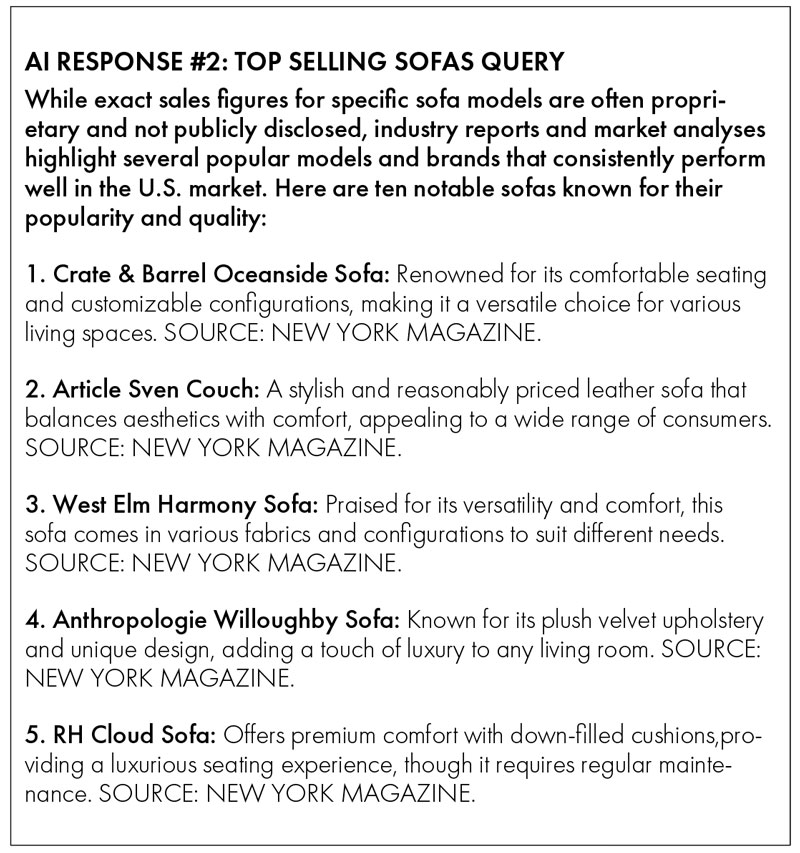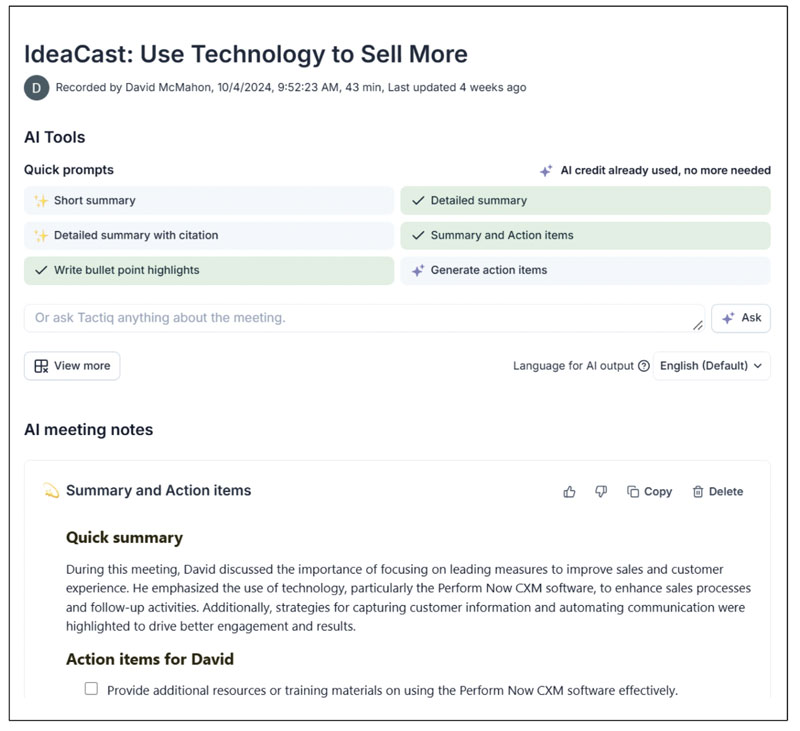As the home furnishings industry continues to embrace artificial
intelligence (AI), businesses stand to benefit from enhanced efficiency,
optimized customer experiences, and increased profitability. In recent
discussions with performance group members and CRM software clients, I
explored various AI-driven strategies across marketing, merchandising,
sales, and operations. Here’s a look at these areas and some potential
value-added AI use cases.
-
AI in Marketing: Data-driven Campaigns and Optimized Content
Creation
AI’s data-processing capabilities are invaluable in the highly
competitive home furnishings landscape. By analyzing customer
demographics, preferences, and purchasing behavior, AI enables
marketing teams to develop targeted campaigns tailored to specific
audiences. AI tools can process vast datasets, including website
interactions, past purchases, and social media, creating robust customer
profiles that inform advertising and promotional strategies. This
precision in targeting can maximize ad spend and improve the relevance
of messaging, thereby enhancing conversion rates.
An entryway into AI for many furniture companies has been content
creation. Tools like ChatGPT can generate content for product
descriptions, blog posts, and social media posts. The result could
increase SEO performance and improve online visibility. AI has the
potential to refine existing promotional content and suggest
improvements in engagement, tone, and clarity. For example, by analyzing
past campaigns, AI can provide insights into messaging that may better
resonate with customers. It also may offer actionable recommendations to
make future promotions more impactful. The result for many retailers
could be a more dynamic and responsive content strategy that keeps
brands visible and relevant.
AI can analyze how competitive retailers position themselves in
marketplaces with policies and current promotions. See an example below
of an AI response (#1) to a query about what furniture retailers are
advertising in the San Diego, California, market.
“AI’s potential to refine existing promotional content and suggest
improvements in engagement, tone, and clarity cannot be overstated.”
-
AI in Merchandising: Inventory Management and Trend
Identification
Effective inventory management is a significant challenge in the home
furnishings industry. Trends shift rapidly, and considerable inventory
risks are common. AI-powered systems can help manage stock by
forecasting demand, identifying top-selling products, flagging
slow-moving inventory, and sourcing new products. AI insights can
further assist businesses in maintaining optimal inventory balance,
ensuring that popular items remain in stock and losses are minimized on
slow-moving items.

AI can identify trends by analyzing data from online sources such as
social media, industry reports, and competitor offerings. It can help
businesses stay current with trends, such as popular materials, colors,
and furniture designs. For example, if mid-century modern styles or
eco-friendly materials are trending, AI can highlight this information,
enabling businesses to consider adjusting product mixes accordingly. A
proactive approach positions companies to respond faster to market
changes, aligning inventory with customer preferences and avoiding the
risk of stocking outdated items. It’s also a quick and easy way to
research possible additions to product lineups before attending a
furniture show. Retailers might, for example, ask ChatGPT, “What are
some top-selling sofas in the USA?” See “AI Response #2:” at left.
Note that when asked the same question multiple times, whole-language
chatbots like GPT will return different answers. Asking the right
questions and qualifying them to limit source material can improve
results.


Additionally, voice-activated queries in AI-driven systems will be able
to allow staff to retrieve information about inventory levels,
bestsellers, and other metrics in real-time without using their hands.
This functionality will reduce the need for manual data entry and
accelerates decision-making, allowing employees to spend more time
delivering exceptional customer service.
“Asking the right questions and qualifying them to limit source material
will improve results.”
-
AI in Sales: Enhanced Training, AI Chat, QR Codes, and Personalized
Communication.
AI can support sales by making training and resources more accessible.
Sales teams can use AI tools to create and locate process documentation,
training modules, and product information in a centralized, easily
accessible location. Having immediate access to relevant data can help
employees better understand products, handle objections, and engage with
customers.
AI Chat: AI chatbots are begging to either co-exist or
take the place of humans. Chatbots can now be “trained” and “learn” to
process common questions asked by customers. These questions can
produce recommendations that in turn could pass a tangible lead on to a
sales associate. The AI bot may recommend merchandise and provide a
link to schedule an appointment with a real person, for example. A
common question retailers ask is, “How do I manage the chat 24 hours a
day?” The answer is “Turn on the AI Chatbot!”
QR Code Integration: Integrating QR codes into the
retail experience is a popular way to enhance in-store and remote
shopping. QR codes linked to product details allow customers to explore
information at their own pace, viewing product specifications, pricing,
and reviews without asking sales associates. This can empower customers
and foster a more informed shopping experience, increasing satisfaction
and sales volume.
AI Personalized Communication: AI enables personalized
customer communication. With AI-enabled email templates and automation,
businesses can automate post-purchase follow-up, offer tailored
recommendations and generate customer reminders about new arrivals and
special offers. These personalized interactions nurture customer
relationships, increasing the likelihood of repeat purchases and brand
loyalty.
Below is an unedited AI-generated email template from our CRM software.
It was created in one second by filling in standardized fields and a
pull-down menu.

The query entered into the CRM content builder was to: “Build an email
to add a rug to a room.” Then a choice of template was made, a subject
specified, “Elevate Your Living Room with the Perfect Rug,” and
preheader text entered, “Discover how adding the right rug can transform
your living space.”
“AI can identify trends by analyzing data from online sources such as
social media, industry reports, and competitor offerings.”
-
AI in Operations: Streamlined Documentation and Continuous Process
Improvement
AI’s ability to record and document meetings is invaluable for
operational efficiency, especially for large teams where accurate
communication is crucial. Automated transcription tools capture
conversations, identify action items, and organize notes, ensuring that
all team members clearly understand the next steps and priorities. This
functionality reduces the time spent on manual notetaking and keeps
everyone aligned on project goals. See the “Ideacast: Use Technology to
Sell More” example on page 10, based on AI output from a recorded
meeting.
AI also plays a role in optimizing operational processes, from delivery
to post-purchase services. For example, AI can analyze customer
feedback and identify areas for improvement in delivery processes, such
as customer pickups or white-glove delivery services. Data from past
deliveries can highlight common challenges or delays, helping businesses
refine procedures to reduce wait times and ensure seamless experiences.
To illustrate, below is a portion of an AI-generated checklist created
by accessing customer feedback and delivery data.
AI’s integration into the home furnishings industry offers transformative
potential across marketing, merchandising, sales, and operations. By
leveraging AI, businesses can deliver highly personalized customer
experiences, streamline internal processes, and stay agile in response to
changing market trends. Companies prioritizing AI-driven solutions will be
well positioned to lead in an increasingly digital and customer-centric
market.
On the horizon are AI-enabled whole language models that promise to handle
lead funnel shopper inquiries in a way that mimics natural human dialogues
using realtime inventory and other data to coordinate post-inquiry
follow-up.
Through capable technology leadership, organizations can use AI to
strengthen their connections with customers, making them more competitive
and adaptable in today’s rapidly evolving business environment.